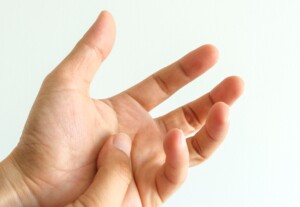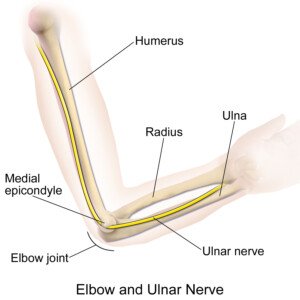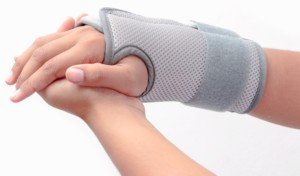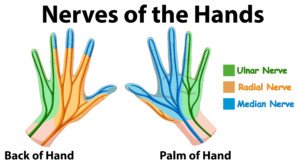
Numb, dead, tingling arms and hands…
Do you awaken in the morning, or in the middle of the night, realizing that an arm, hand or both are completely numb, as though dead?
When you poke at the arm or hand with your “good” hand, is it like poking a piece of dead meat?
There are multiple possible reasons why with sleep, your arm, hand or flingers will “fall asleep” and be numb and tingly.
I know what it’s like to awaken in the middle of the night with a totally numb arm or hand, but never thought much of it beyond the nuisance of it.
However, I came to realize that waking with a limb that feels dead or disturbingly tingly can be frightening to some people.
What causes a limb to go numb or dead and/or become tingly while a person sleeps?
Numbness or tingling that you feel in the arms is transmitted by the nerves that run from the arm to the brain.
Anywhere along this pathway, a nerve can be impaired.
“The more severe and more prolonged the symptoms, the more appropriate it is to seek medical advice,” says Dr. David Beatty, MD, a retired general practitioner with 30+ years of experience and an instructor of general medicine for 20+ years.
There may be pressure on the nerve in the arm itself — caused by being in the same position for a while, sustaining that pressure.
However, the point of pressure may also be in the spinal cord or brain.
This would be a much less likely possibility, and any pathology in these locations wouldn’t only cause morning symptoms.
You can quickly verify a positional cause by changing positions, such as removing what seems to have been sustained pressure on your arm or hand.
In my case, waking in the middle of sleep unable to feel my numb arm and/or hand, was always the result of falling asleep with the limb bent across my midsection.
This position caused my elbow to press into the bed, which put pressure on the ulnar nerve (the “funny bone” nerve).

Source: BruceBlaus/CreativeCommons
Body Position’s Effect on the Hands and Arms, and Solutions
If you’ve been suffering from numb, tingly arms and hands after falling asleep, take note of the position of your body.
Where is your elbow?
Is the elbow against anything?
The pressure doesn’t have to be that much to offend the ulnar nerve.
This nerve is not buried deep within the arm, and hence, even what seems like light pressure on it can cause the entire limb to go dead or numb over a period of a few hours or even less, while you are fast asleep.
The ulnar nerve distributes into the hand and the pinky and fourth finger, so that if it’s receiving pressure at the elbow, this will affect the lower arm, hand and the fingers.
Simply straightening the arm at your side, palm up, will relieve the ulnar pressure.
To prevent my own arms from becoming numb overnight, I make sure to fall asleep with my arms straight at my sides, not folded over my midsection, and palms up, which minimizes pressure of the elbow against the bed.
Sleeping on your side can compress nerves in the arm closest to the mattress, so keep that in mind when slipping into bed.
Another cause of numb hands and fingers, though not the arm, while you sleep is a flexed wrist (meaning, the palm is bent towards the underside of the forearm).
This puts pressure on the median nerve, and the result may be a numb, tingly hand and fingers.
Solution? A wrist splint, available at drug stores and online.

Wrist brace. Shutterstock/Praisaeng
“There are lots of neurological diseases that can cause pins and needles or numbness in the arms and hands,” says Dr. Beatty.
If a new-onset numbness is present, and there’s no positional-related explanation, there may be a condition involved — especially if there are other symptoms with it.
Neurological but Benign Conditions
Waking with a numb, tingling, dead-feeling arm or hand is many times a benign condition, even though it’s very uncomfortable and can be quite startling to discover.
“This is a very common problem and the majority are caused by either carpal tunnel syndrome or cervical spondylosis,” says Dr. Beatty.
“The median nerve passes through a bony tunnel in the wrist as it goes into the hand.
“Anything that increases the pressure or tightness within the carpal tunnel can cause symptoms.
“Typically there will be numbness or pain over the thumb, index and middle fingers.
“Part of the ring finger may also be affected. Sometimes the symptoms are referred up the palmar side of the wrist and forearm.

“The symptoms are aggravated by tapping over the base of the palm (Tinel’s sign) or by fully flexing the wrist (Phalen’s sign).”
“CTS is often most troublesome in the morning — presumably because the wrists are flexed during sleep, and this puts more pressure on the median nerve,” continues Dr. Beatty.
“It’s more common in manual workers [plus heavy cashier and keyboard use].
“Any action that puts repeated pressure over the base of the palm can irritate the median nerve.
“The vibration from using power tools and the pressure needed to force a drill in are often to blame.
“Arthritis or a previous fracture of the wrist can trigger it.” So can obesity and drinking.
“If the symptoms are only affecting you briefly in the morning you can try adjusting your lifestyle to lose some weight and reduce alcohol intake.
“Manual workers may be able to adjust how they use tools to reduce trauma to the base of the palm.
“CTS usually causes less symptoms if the wrists are splinted in a straight position overnight.”
A differential for CTS is pronator teres syndrome.
“With pronator syndrome the median nerve is compressed as it passes between the heads of pronator muscles in the forearm,” says Dr. Beatty.
“It’s more common in people performing repeated pronator movements of the forearm (rotating the hand inwards).
“Typically there’s tenderness over the pronator muscles just below the elbow. This tenderness can be aggravated when someone tries to push back on your hand during pronation.”
Cervical spondylosis affects most people as they age, says Dr. Beatty.
“Osteoarthritis of the neck bones can form bony spurs that put pressure on the nerves leaving the neck.
“Disc degeneration means the discs are partly flattened. The vertebral bones are closer together, leaving less space for the nerves to emerge from the spine.
“If a nerve is squeezed it can cause pain, pins and needles or numbness in the area where that nerve supplies.
“This is less likely to happen when the neck is in a straight neutral position.
“During sleep the neck can get bent or twisted inadvertently, irritating the nerves going to the arms and hands.
“Many people with cervical spondylosis know they have a neck problem and some can trigger symptoms by moving the neck in a certain way.
“If the symptoms ease up quickly after waking, there probably isn’t too much to worry about.
“Perhaps adjust the number or type of pillow you use, trying to keep your neck in a relatively straight position. Sometimes using a soft cervical collar, temporarily, gives relief.
“The more persistent, severe or progressive your symptoms are, the more important it is to see your doctor.”
A Serious Cause
If the symptoms persist even after you get up, but then disappear, you might have suffered what’s known as a transient ischemic attack.
This is when a blood clot temporarily cuts off blood flow to the brain.
The younger you are, though, the less likely this will be the cause.
However, a TIA is not at the top of the list for most likely causes of morning numbness and tingling when a pressure-related cause can be ruled out.
 Dr. Beatty has worked in primary medicine, surgery, accident and emergency, OBGYN, pediatrics and chronic disease management. He is the Doctor of Medicine for Strong Home Gym.
Dr. Beatty has worked in primary medicine, surgery, accident and emergency, OBGYN, pediatrics and chronic disease management. He is the Doctor of Medicine for Strong Home Gym.
 Lorra Garrick has been covering medical, fitness and cybersecurity topics for many years, having written thousands of articles for print magazines and websites, including as a ghostwriter. She’s also a former ACE-certified personal trainer.
Lorra Garrick has been covering medical, fitness and cybersecurity topics for many years, having written thousands of articles for print magazines and websites, including as a ghostwriter. She’s also a former ACE-certified personal trainer.
.
Top image: Shutterstock/Seasontime
Cause of Tingling on Tip of Nose Includes Multiple Sclerosis
Limbs Fall Asleep Easily? Causes, Solutions to Numb & Tingling
Chest Pain, Pain/Numbness in Left Arm, Burping: Heart Attack?









































